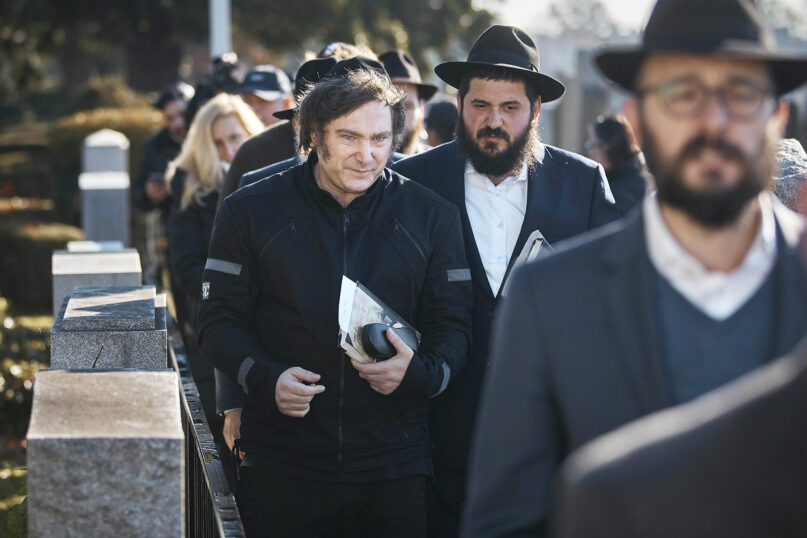(RNS) — A week after being elected Argentina’s next president, the self-defined anarcho-capitalist economist Javier Milei left the country on a double pilgrimage, first visiting the grave of a Hasidic Jewish leader in New York, with plans to head to Israel. While both destinations have plenty of political and especially economic import for Milei and his country — he plans to visit International Monetary Fund officials while in the United States — he says his travels have a “spiritual” dimension.
In New York, Milei visited the grave of Menachem Mendel Schneerson, an Orthodox leader of the Chabad-Lubavitch movement who died in 1994. It was Milei’s second visit since July, before he survived Argentina’s first electoral round; his intention now, he said, was to thank the rebbe, considered by many a Jewish messiah who is able to perform miracles from the afterlife, for his defeat of Sergio Massa, a Peronist and Argentina’s finance minister, on Nov. 19.
The Israel portion of Milei’s trip will demonstrate not only his support for the country — a rare stance for a Latin American leader — but his connections to the Jewish faith, which Milei said he has been studying for two years with Rabbi Shimon Axel Wahnish, a friend and a leader of the Moroccan Jewish community in Buenos Aires.
Raised Roman Catholic, Milei has repeatedly declared his intention to convert to Judaism. In September he said he does “not go to the church, but to the temple,” and that he is “almost becoming a Jew, the only thing needed is a blood pact.” (Earlier this week, Bloomberg News reported that Milei had converted, but the news agency later walked back the story.)
Before departing Buenos Aires, Milei, who will be inaugurated Dec. 10, met with Rabbi David Pinto, a major Orthodox leader.
In the presidential campaign that ended in his election, Judaism was not the only religion in the mix. Often compared to former U.S. President Donald Trump or former Brazilian President Jair Bolsonaro, Milei did not work to galvanize the support of conservative Christian churches as those leaders did, but many evangelical Christians voted for him.
Walter Zarini, a Baptist pastor in the Buenos Aires district of Claypole, told Religion News Service that he voted for Milei because his agenda seemed “more just and equitable than the communism and populism that Argentinians endure now.”
Zarini said many of his congregants shared his view. “We don’t talk about party politics in the church. But I believe that it was quite divided among those who wanted change and those who voted for continuity,” he said.
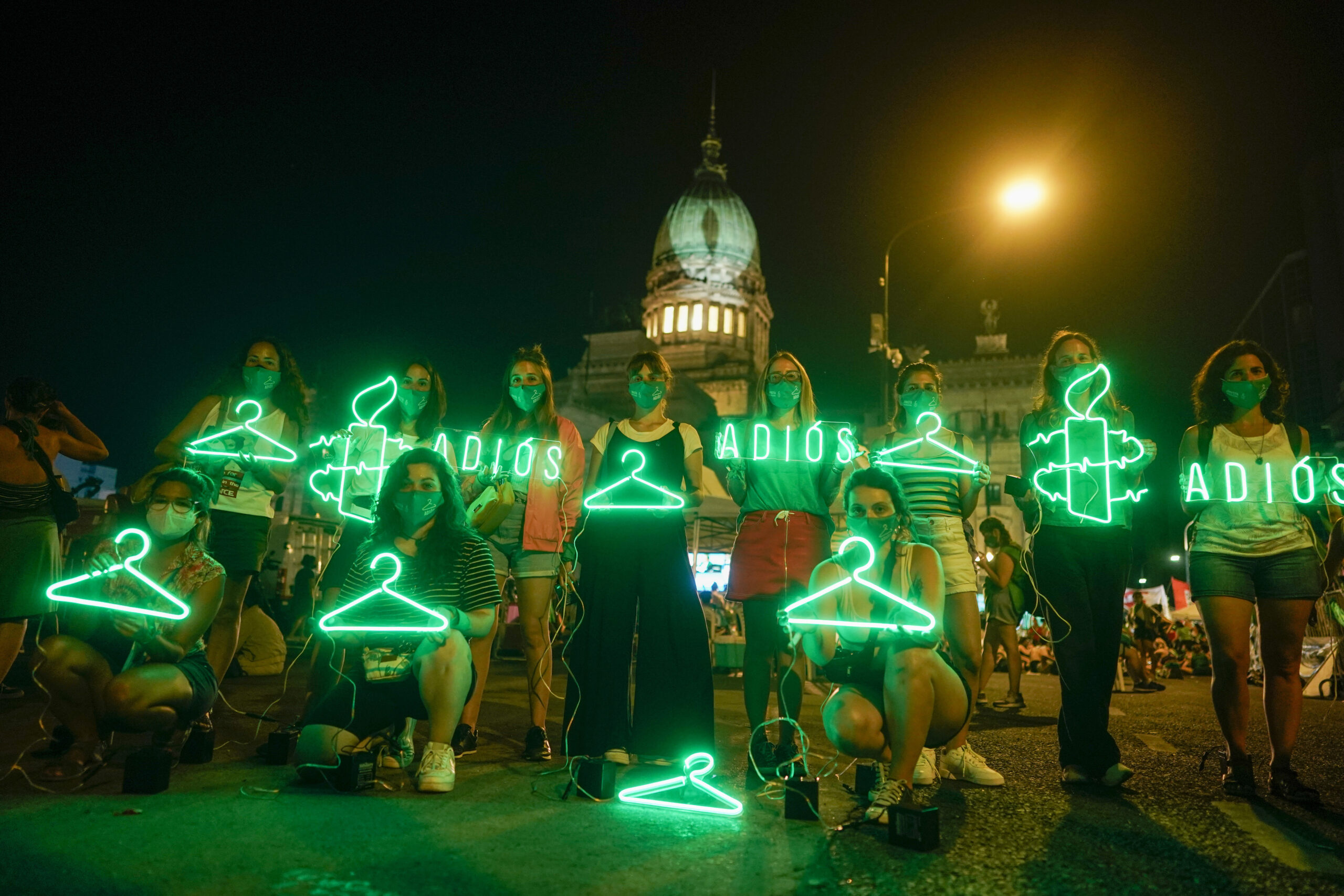
Abortion-rights activists hold hangers, symbolizing illegal abortions, and signs reading in Spanish “Goodbye” after lawmakers approved a bill that legalizes abortion outside Congress in Buenos Aires, Argentina, on Dec. 30, 2020. (AP Photo/Victor Caivano)
One of evangelicals’ top issues is abortion, which has been legal in Argentina until the 14th week of pregnancy since 2020, and which Milei opposes. Last week Bertie Benegas Lynch, a member of Milei’s party who represents a neighborhood of Buenos Aires in the House of Deputies, said he will work to repeal the 3-year-old abortion law.
“People can decide if they will curtail the life process of an embryo, but I hope that the state is not the one paying for it,” said Zarini.
Despite his abortion stance, Milei didn’t depend on a solid evangelical bloc for his victory, according to Marcos Carbonelli, a researcher at Argentina’s National Scientific and Technical Research Council and an expert on the nation’s religious dynamics.
“The evangelical world is highly fragmented and it did not mobilize voters to support him. The major Christian association asked to have meetings with all the candidates and Milei failed to attend,” said Carbonelli.
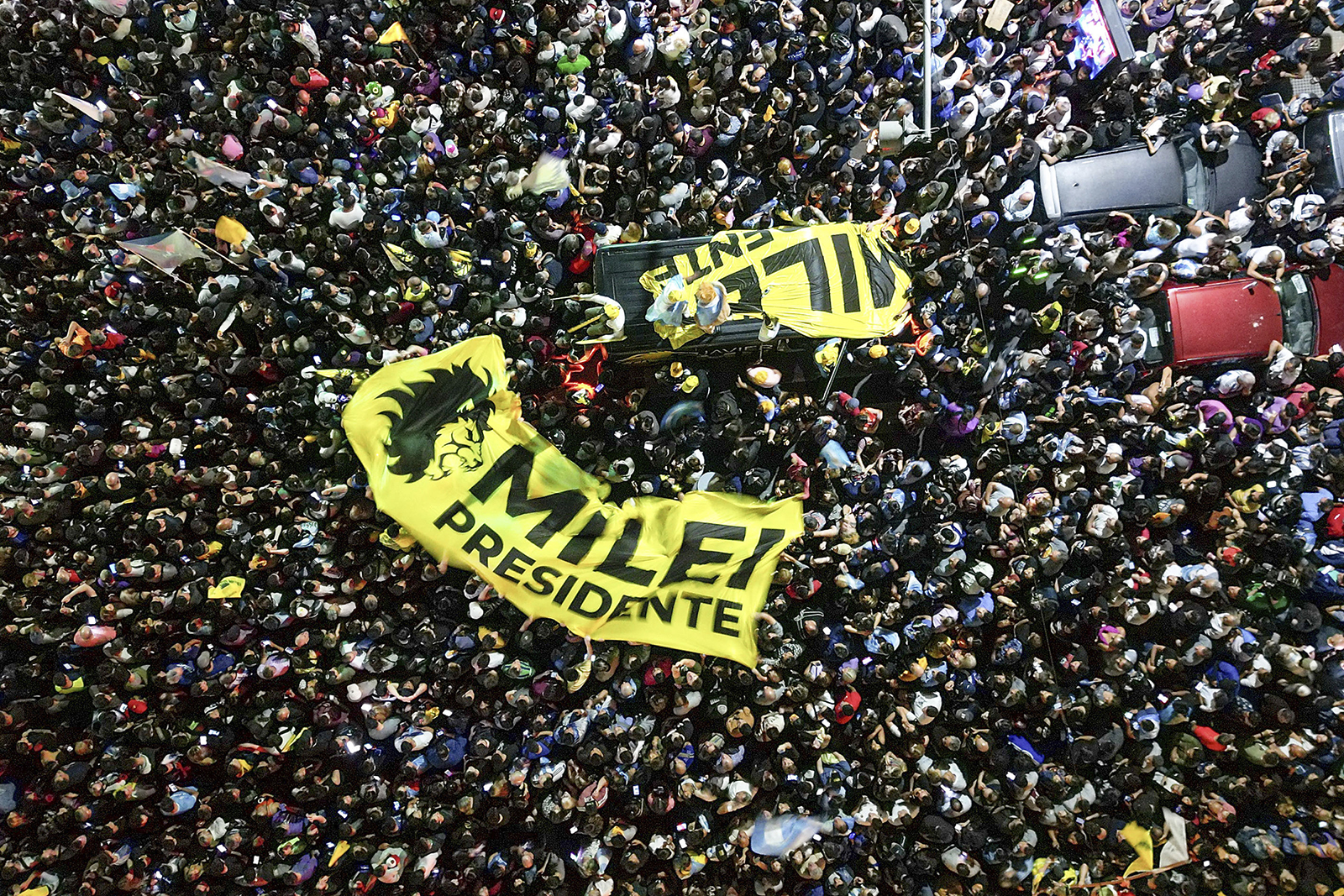
Supporters of presidential candidate Javier Milei gather outside his campaign headquarters after his opponent, Economy Minister Sergio Massa, conceded defeat in the presidential runoff election, in Buenos Aires, Argentina, Nov. 19, 2023. The right-wing populist handily beat the ruling party’s candidate 55.7% to 44.3%. (AP Photo/Matias Delacroix)
Nor did Milei draw the support of the Catholic Church. Some conservative Catholics were attracted by his running mate, Victoria Villarruel, a traditionalist Catholic, but the country’s Catholic hierarchy stayed mostly quiet, Carbonelli said.
Milei did himself no favors by calling Pope Francis, an Argentine who was once the archbishop of Buenos Aires, an “imbecile” and a “communist” on X and in interviews, citing the pontiff’s social justice stances.
Milei, an acolyte of libertarian icons such as the economists Ludwig von Mises and Friedrich Hayek, targeted social welfare spending in his campaign promises to reduce the state’s participation in the economy.
The comments angered progressive Catholics especially, who organized marches and in September held a Mass where opponents to his candidacy rallied. Among those protesting were curas villeros, or “slum priests.” A politically powerful group in the Argentine church, the group formed n the 1960s as slums around Buenos Aires and other major cities grew rapidly in those years. The group was a vital part of the resistance to the rule of Argentina’s military junta from 1976 to1983.
The curas villeros have also played a central role in supporting the poor amid the country’s repeated economic crises, including the current one, which has seen inflation climb past 130% annually and has left millions in poverty.
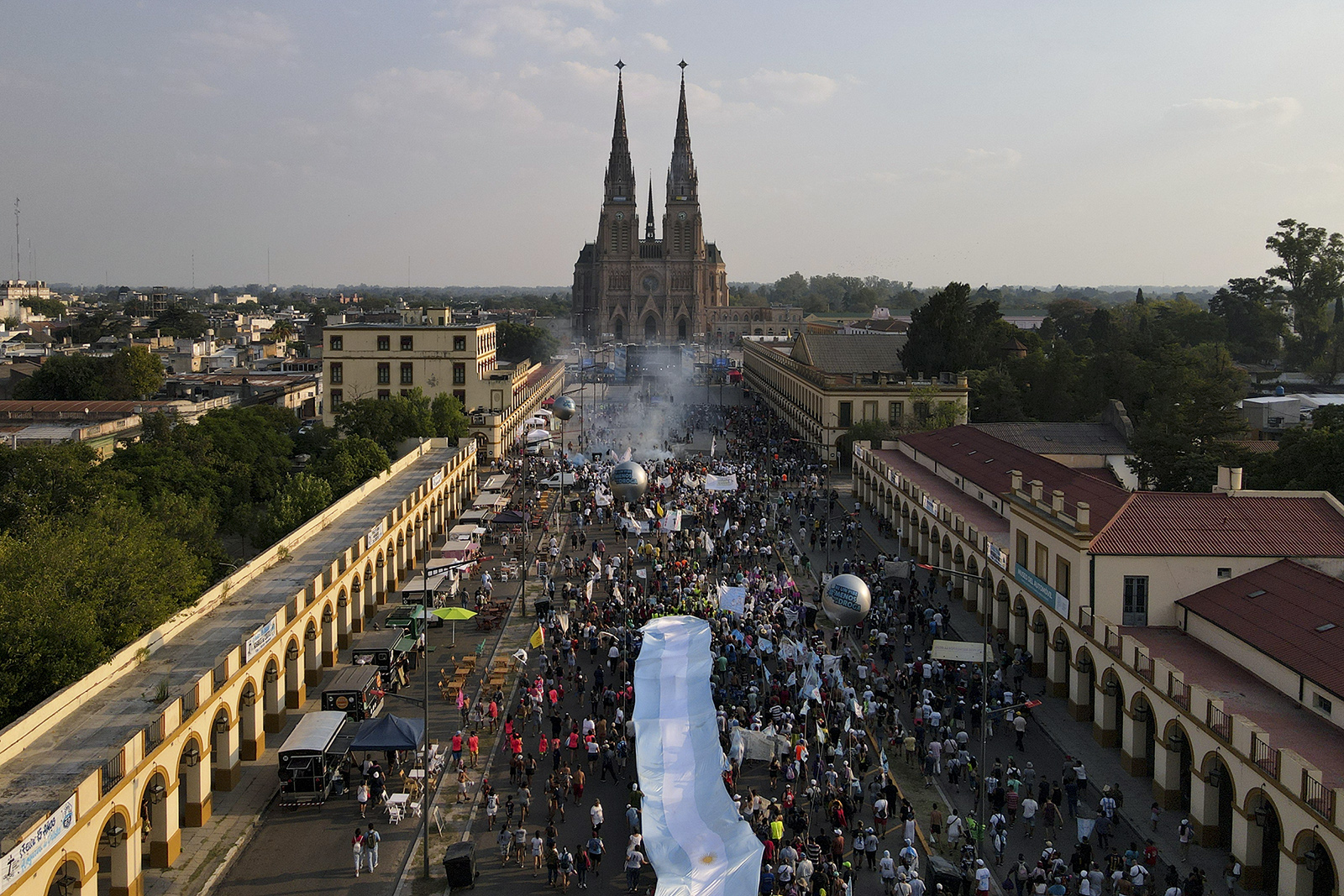
Faithful walk toward the cathedral to attend a Mass celebrating 15 years of the Familia Grande Hogar de Cristo organization that works to rehabilitate drug addicts and marking Pope Francis’ 10-year anniversary as pope, in Lujan, Argentina, March 11, 2023. (AP Photo/Natacha Pisarenko)
Francis, as Cardinal Jorge Mario Bergoglio, had a deep connection to the slum priests, and they were out in force at the Mass in celebrating the pope and supporting the church’s social doctrine.
With more than 40% of Argentines living below the poverty line, the slum priests and their allies are concerned that Milei’s “liberal shock” to the economy will only worsen the situation. “The people in the poor neighborhoods are afraid. They don’t know what will happen,” said the Rev. Lorenzo de Vedia, known as Padre Toto.
“We hope that the state keeps working for the people in the slums. But the most important part of our work doesn’t depend on the economy, so we will keep doing our things here as we have always done,” he added.
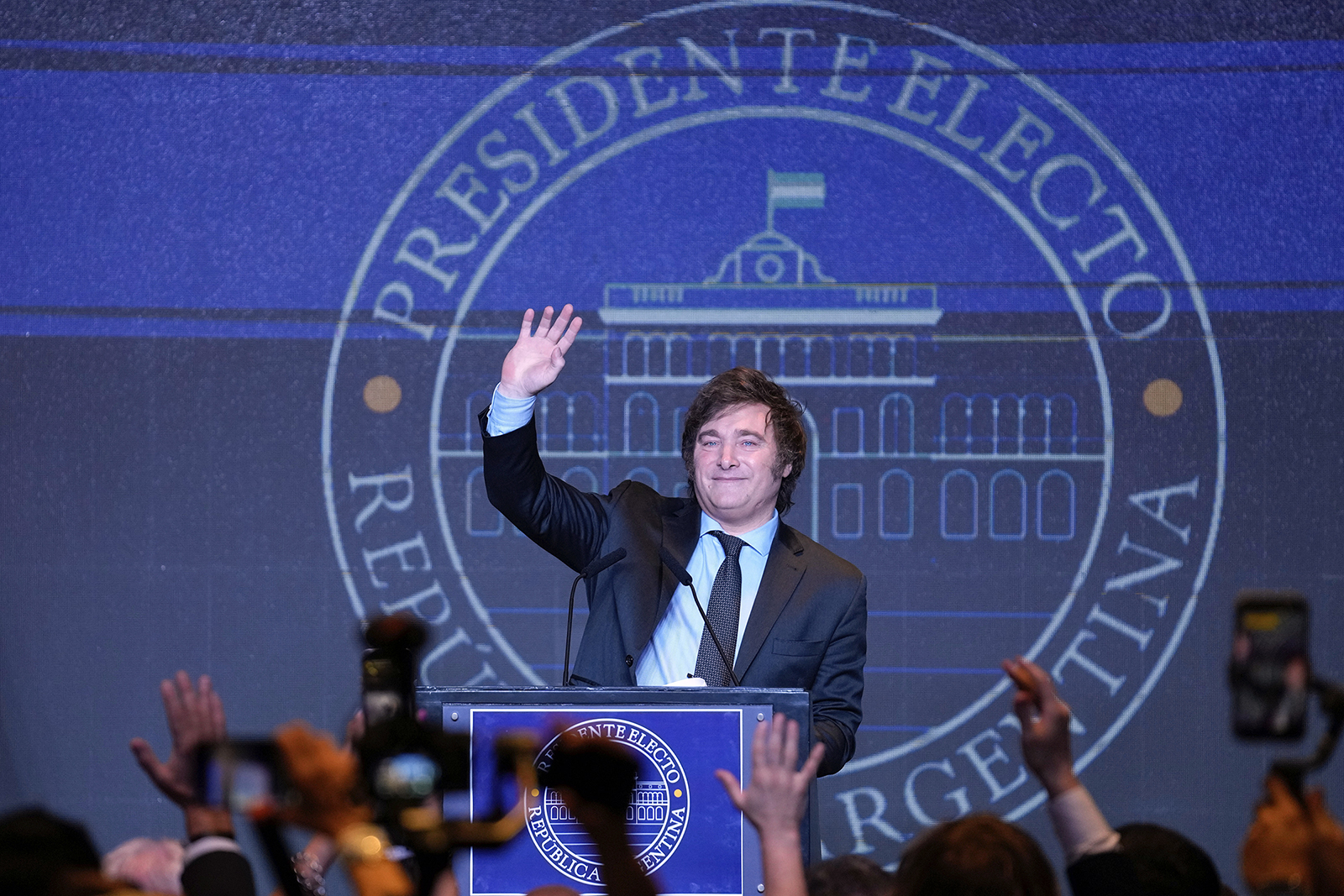
Presidential candidate of the Liberty Advances coalition Javier Milei waves during his victory speech after winning the presidential runoff election in Buenos Aires, Argentina, Nov. 19, 2023. (AP Photo/Natacha Pisarenko)
But Milei’s rockabilly hairstyle and his unconventional TV appearances have drawn popular attention, especially among the youth, and he received support in poorer areas as much as he did from traditionally conservative sectors.
Milei’s dalliance with Judaism, then, is just one further faith-based oddity of the electoral season. According to sociologist Damián Setton, an expert at the National Scientific and Technical Research Council on the Argentine Jewish community, Jews have historically been associated with socialism and subversion in a highly antisemitic Argentina.
“Now, the new right, of which Milei is part, has incorporated one of the historical antisemitic myths, the idea that Jews are rich people, but in a positive way. Catholicism is now seen as a religion of poverty and Judaism as the religion of wealth,” he told RNS.
Part of this ideology is fierce support for Israel, Setton said. Milei has declared that he will follow the United States and other countries in moving his country’s embassy from Tel Aviv to Jerusalem.
“When he affirms his support to Israel, he demonstrates that he is part of the Western geopolitical bloc. Israel is also seen as a country where the free market led the economy to progress. He wants to be associated with all that,” he added.
If Milei converts, he will be the first Jewish Argentine president in a country that, until 1994, only allowed Catholics to assume the presidency. But Setton said that he expects Milei’s plate will soon be too full to make a switch. “I don’t think religion will play any real role in his tenure,” Setton said. “He is facing several political challenges and will deal with them in the sphere of politics.”
